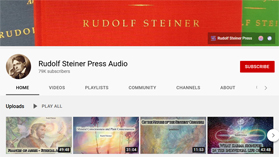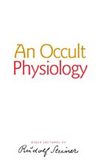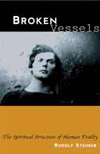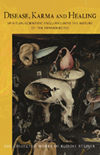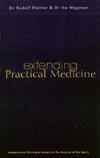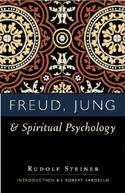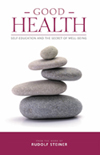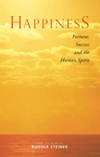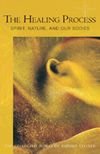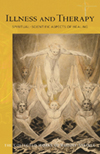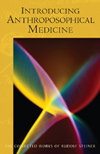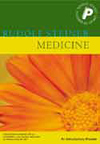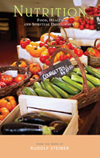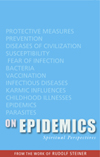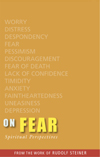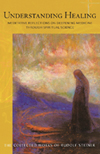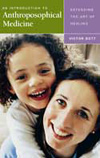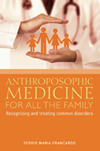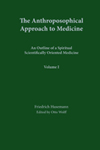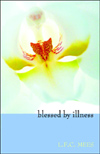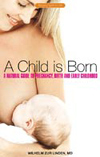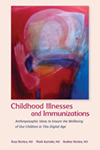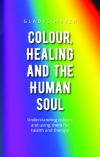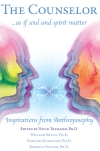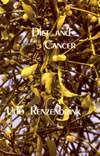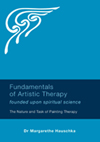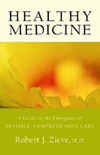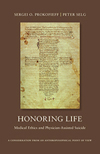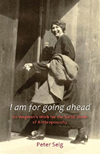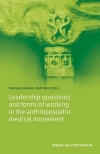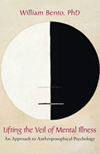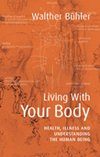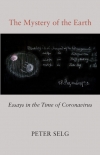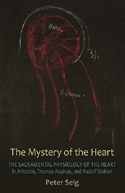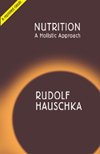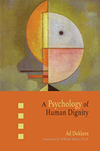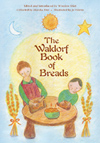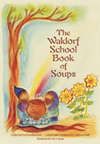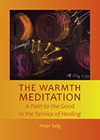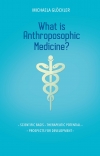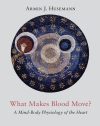
- RUDOLF STEINER
- OTHER AUTHORS
-
MEDICINE AND HEALTHRUDOLF STEINER
Given the upsurge of interest in complementary therapies and treatments, medical researchers are gradually being pressured to reassess and expand existing knowledge about the structure and organization of the human body. But in spite of the advances in modern technology, there are vast areas of human physiological activity, which continue to remain undetectable. Such processes, indicates Rudolf Steiner, are connected to spiritual forces.
The Spiritual Structure of Human Frailty
"Foundations of Anthroposophical Medicine" series
Previously published as Pastoral MedicineToday a great deal is written about holistic medicine as an approach to healing that integrates body, mind, and spirit. In these lectures, given to a mixed audience of doctors and priest-theologians, Rudolf Steiner renews the ancient tradition of "pastoral medicine", which involves the working together of trained physicians with those having the care of the patient's soul and spirit. He shows that healing is not possible unless it takes into account the invisible as well as the visible dimensions.
Spiritual-Scientific Enquiries into the Nature of the Human Being
Today, illness is almost universally regarded as either a nuisance or a grave misfortune. In contrast to this conventional thinking, Rudolf Steiner places the suffering caused by disease in a broad vista that includes an understanding of karma and personal metamorphosis. Illness comes to expression in the physical body, but mostly does not originate in it, says Steiner, and thus a key part of the physician’s work involves gaining insight into the whole nature of an individual – his essential core being. From this perspective, illness offers us the opportunity for deeper healing.
Fundamental Principles based on the Science of the Spirit
Dr Ita Wegman
In this classic introductory work on spiritual medicine, Rudolf Steiner worked in unique literary collaboration with the physician Ita Wegman. Their aim was to revitalise the art of healing through spiritual knowlege - yet in so doing they did not underrate or dismiss modern scientific medicine, but illumined it beyond its present materialistic outlook to a fuller realisation of the human condition.
FREUD, JUNG AND SPIRITUAL PSYCHOLOGY
5 Lectures
Intro. R. Sardello
"Imagine, just for a moment, how many people in the world practice psychotherapy, how many are patients of one therapy or another, and how many are now involved in the growing numbers of therapeutic groups focused on various addictions. One might think that a great deal of 'soul work' goes on here. But, due to the fundamental errors at the very founding of the discipline, it may well be that psychotherapy is oriented toward conquering soul rather than entering into soul wisdom."
Self-Education and the Secret of Well-being
Rudolf Steiner offered numerous practical methods to enrich and enliven our daily lives. Drawing on these, the texts in this anthology provide a wealth of ideas to strengthen our health through self-education and personal development. The content ranges from tangible and easy-to-practise exercises to relevant observations on human nature.
Fortune, Success and the Human Spirit
What is true happiness? This perennial question preoccupies many experts, including biologists, psychologists, sociologists and theologians, but their findings usually confirm what we already knew: that happiness is one of the most sought-after but elusive commodities.
Spirit, Nature and Our Bodies
In all his lectures to doctors and in his explanations of anthroposophic medicine, Steiner emphasized that his medical concepts are not intended to replace conventional Western medicine, but to extend it; diagnosis and healing methods are expanded to include our soul and spirit.
Spiritual-Scientific Aspects of Healing
‘An external view of states of health and sickness must be augmented by what we can also know about the inner, spiritual reality within the human being.’ – Rudolf Steiner
INTRODUCING ANTHROPOSOPHICAL MEDICINE
Taking account of modern medical knowledge and practice, and deeply versed in alchemical, Paracelsian, and naturopathic approaches, as well as homeopathy, aroma therapy, and other 'alternative' therapies, Steiner demonstrates, on the basis of his own researches, how a truly integrated whole-person medicine is possible - one that understands the human as a being of body, soul, and spirit; a microcosm in the macrocosm, a mirror of the earth and of the heavens.
An Introductory Reader
Compiled with an introduction, commentary and notes by Andrew Maendl, MD
Understanding man's true nature as a basis for medical practice; The science of knowing; The mission of reverence; The four temperaments; The bridge between universal spirituality and the physical; The constellation of the supersensible bodies; The invisible human within us: the pathology underlying therapy; Cancer and mistletoe, and aspects of psychiatry; Case history questions: diagnosis and therapy; Anthroposophical medicine in practice: three case histories.
Food, Health and Spiritual Development
Our instinctive knowledge of which foods are helpful and which are harmful appears increasingly to be fading. We are bombarded with advice, information and prescriptions as to what we should eat and drink, but the issues surrounding nutrition - questions of health, diet, taste, even ecology and sustainability - remain largely unresolved.
Spiritual Perspectives
"If we can bring nothing up out of ourselves except fear of the illnesses which surround us at the seat of an epidemic, and if we go to sleep at night filled with nothing but thoughts of this fear, then we create unconscious replicas, imaginations, which are drenched in fear. And this is an excellent method for nurturing bacteria..." - Rudolf Steiner
Spiritual Perspectives
"We must eradicate root and branch any fear and dread in our soul concerning the future that is coming towards us... We must develop composure with regard to all the feelings and sensations we have about the future; we must anticipate with absolute equanimity whatever may be coming towards us, thinking only that whatever it may be will be brought to us by the wisdom-filled guidance of the universe." - Rudolf Steiner
Meditative Reflections on Deepening Medicine through Spiritual Science
Rudolf Steiner’s third great lecture course to physicians has a completely different character to his previous presentations. Delivered in response to a group of young doctors – who approached Steiner with the specific request for a course that would be ‘quite intimate’, but should not contain anything ‘…which appealed only to knowledge and the intellect’ – it offers unique, ground-breaking insights into the practice and art of healing.
-
MEDICINE AND HEALTHOTHER AUTHORS
AN INTRODUCTION TO ANTHROPOSOPHICAL MEDICINE
Extending the Art of Healing
Victor Bott
In modern times western societies have become increasingly familiar and at ease with many complementary and alternative types of medicine, often derived from eastern sources. Rudolf Steiner's anthroposophical medicine, founded in the early part of the twentieth century, is a renewal of the original sources of western medicine. However, unlike many modern medical practices based on reductionist, materialistic thought, Steiner's truly holistic system encompasses a picture of the human being as an entity of body, soul and spirit. Anthroposophical medicine seeks to bring harmony to these various aspects of the human constitution.
ANTHROPOSOPHIC MEDICINE FOR ALL THE FAMILY
Recognizing and treating the most common disorders
Sergio Maria Francardo
This invaluable book not only provides practical suggestions and advice regarding common medical issues and ailments, but also presents the fundamental principles of anthroposophic medicine. It explains the underlying picture of disorders in the human organism and the therapeutic approach of anthroposophic medical practice, giving answers to the questions that, in an ideal world, a patient would like to discuss at length with his or her doctor.
THE ANTHROPOSOPHICAL APPROACH TO MEDICINE
An Outline of a Spiritual Scientifically Oriented Medicine: Vol. 1
Edited by doctors Friedrich Husemann and Otto Wolff
Today's medicine is strongly influenced by natural science, which focuses entirely on the material nature of reality. Molecular biology has become the foundation of modern medicine with the result that today's medical industry chases after technology to solve all its problems. In the process it is losing its own essence as it moves into fields increasingly alien to human nature as a whole.
L. F. C. Mees
Illness may be seen as a helper and problem- solver in life, and the medical doctor can assist this function through a new approach to therapy.
A Natural Guide to Pregnancy, Birth and Early Childhood
Wilhelm zur Linden
Prospective parents are faced today with a huge selection of guidebooks on pregnancy, birth and early childhood. While many of these offer sensible advice and information, Dr zur Linden's long-established natural care book offers an important additional dimension. In clear and accessible language, he explains what the newborn baby and small child need to unfold harmoniously the full potential of body, soul and spirit. Based on this broad perspective, he offers many practical suggestions.
CHILDHOOD ILLNESSES AND IMMUNIZATION
Anthroposophic Ideas to Ensure the Wellbeing of Our Children in This Digital Age
Ross Rentea
Mark Kamsler and Andrea Rentea
“This book, a highly researched yet accessible body of work, explains how current influences, primarily immunizations, infiltrate the child’s organism and make growing up more difficult. The book, however, then also offers many practical ways to overcome those hurdles. Supporting the health of the developing child with anthroposophic education and anthroposophic medicine will thus ‘soften’ the blow to the archetypical, desired development. The authors show dedication, integrity and clarity throughout the book.”
— Mary Jo Oresti, MA, Founding member of the Educational Support Program at the Detroit Waldorf School and Director and founding member of the Teacher Educational Support Program, an international professional development program sponsored by the Association for a Healing Education.COLOUR, HEALING AND THE HUMAN SOUL
Understanding colours and using them for health and therapy
Gladys Mayer
In a delightful study – originally comprising two separate booklets – the accomplished artist and teacher Gladys Mayer explains that colour is nothing other than the very substance of the soul. Just as the body is made up of mineral, water, air and warmth, so the soul is made up of colour. This is revealed in the emotions of sadness and joy and the many shades in between, as expressed in human language – for example: ‘seeing red’, ‘rose-coloured spectacles’ and ‘jaundiced view’.
Edited by Susanne Bennett
Illustrated by Elizabeth Auer
The Community Cooks is melting pot of favorite recipes collected from the families of the Pine Hill Waldorf School and the Wilton/Temple Farm Community in Wilton, N.H.
...as if Soul and Spirit Matter
Inspirations from Anthroposophy
Edited by David Tresemer
"In an anthroposophic approach to counseling and psychotherapy we integrate the whole paradigm of spiritual science into the contemporary forms of psychology, thereby reformulating a psychology inclusive of body, soul, and spirit." - Dr. William Bento, former executive director of the Association for Anthroposophic Psychology, author of Lifting the Veil of Mental Illness.
Udo Renzenbrink
FUNDAMENTALS OF ARTISTIC THERAPY
Founded upon Spiritual Science
The Nature and Task of Painting Therapy
Margarethe Hauschka
Based on many years of medical, artistic, therapeutic and anthroposophical experience, the author presents a concentrated foundation for the development of artistic therapy and the training of therapists. Although written with the painting therapist in mind, this clearly-formulated book – the fundamental work in its field – will also be of interest to those involved in medical and general therapeutic work, as well as to serious students of anthroposophy. It includes fifty full-colour examples from Hauschka’s course at the School for Artistic Therapy.
A Guide to the Emergence of Sensible, Comprehensive Care
Robert Zieve, MD
Forward D. Klinghardt, MD, J. Oschman
Dr Zieve - widely studied in anthroposophic and other types of complementary medicine - presents a new paradigm for health care that shows us how to go beyond the limitations and severe deficiencies of our current sickness care system. It embraces and synthesizes the emerging models of integrative medicine, energy medicine, and energy psychology into an effective and affordable approach to healing for everyone.
Medical Ethics and Physician-Assisted Suicide
A Consideration from an Anthroposophical Point of View
Sergei O. Prokofieff
Peter Selg
The reflections in this book by Peter Selg and Sergei Prokofieff on the soul-spiritual, ethical, and medical-therapeutic issues surrounding physician-assisted suicide (and suicide as such) will provoke thought, feeling, and the will. It takes its inspiration from both Rudolf Steiner and the ancient Greek Hippocratic Oath.
Ita Wegman's Work for the Social Ideals of Anthroposophy
Peter Selg
"Ita Wegman is not only an inspiring genius of Anthroposophy, but she is also a healing genius of anthroposophic medicine. Perseverance, courage, greatness mark her being." - Emanuel Zeylmans van Emmichoven
LEADERSHIP QUESTIONS AND FORMS OF WORKING IN THE ANTHROPOSOPHIC MEDICAL MOVEMENT
Michaela Glöckler
Rolf Heine (eds.)
Rudolf Steiner is known around the world as an author, speaker and the creator of anthroposophy, yet few are aware of him as an inaugurator of new ways of working together. As a result, questions of management and leadership are especially challenging, even in institutions that work out of anthroposophy. Here the model for forms of collaboration created by Steiner in 1923/24 can serve as an inexhaustible source of inspiration. Using this social concept as an orientation, the authors show how the social framework of the anthroposophic medical movement has evolved and stood the test of time since 1988. A ‘leadership style with heart’ was needed that could unite the principles of individual responsibility, collegial leadership and democratic codetermination.
LIFTING THE VEIL OF MENTAL ILLNESS
An Approach to Anthroposophical Psychology
William Bento
Mental illnesses are too often seen only in abstract terms. In keeping with this, mainstream psychology, which seldom acknowledges the psyche or soul, relies increasingly on pharmaceutical treatment.
Health, Illness and Understanding the Human Being
Walther Bühler
How can we truly understand the vital questions of health and illness, which are so much part of our everyday lives? Good nutrition, exercise and relaxation are only some of the answers, says Bühler. What we really need is a comprehensive insight into our true human nature, including the various forces working within and through us.
Essays in the Time of Coronavirus
Peter Selg
“Rudolf Steiner himself did not just comment critically about the out-of-hand ‘fear of bacilli’ or the ‘obsession with hygiene’ as ‘modern superstition,’ but also warned about the dangerous reality of ‘pathogens of the worst kind’ that could become ‘destroyers of human life’ and bring with ‘dreadful epidemics’.”
Studies on the Sacramental Physiology of the Heart
Aristotle | Thomas Aquinas | Rudolf Steiner
Peter Selg
"Every moral deed and every physical action in human life is connected in the human heart. Only when we truly learn to understand the configuration of he human heart will we find the true fusion of these two parallel and independent phenomena: moral events and physical events." - Rudolf Steiner
A Holistic Approach
Rudolf Hauschka
Today's understanding of nutrition is based largely on physical, chemical considerations and analysis. Hauschka takes a radically different approach, viewing matter - and food in particular - as having a spiritual aspect. From this holistic perspective he presents a new, practical approach to nutrition.
Illuminating Ancient Cryptic Truths
Anna Lups
“Interpreting the final drawing from the Child Artist is for me the beginning of an exploration into the meaning of this exquisite gift he placed in my hands. As in the Gnostic myth, it involves a polarity. The Good and the Evil present themselves in their balanced capacity. Humanity meets the devouring monster and can slay it only after many painful sojourns into the depth of the Earth. On the horizontal plane, the domain of darkness, cacophony, and false gods, the overpowering jaws can annihilate me. It attacks my life force; it comes to me in the guise of a huge head with ferocious teeth; its small triangular body is chaotic, and the limbs are rudimentary. Is this me? The question lingers: Who can be identified as the Child Artist? Still in our midst, how can he be met? Do we want to pave a way to better listening and understanding?” (from the book)
Ad Dekkers
Originally published in the Netherlands in 2011, this book is the result of a life's work devoted to developing the craft of psychotherapy in a way that leaves the therapist's and the client's own responsibilities intact and that stimulates a direct, open, and honest link with day-to-day reality.
Edited and introduced by Winslow Eliot, Illustrated by Jo Valens
Marsha Post
Like the bestselling Waldorf Kindergarten Snack Book and the Waldorf School Book of Soups, this newest book in the series provides yet another a rich resource for spending time in the kitchen with young children - this time baking bread. What child doesn't like to feel and knead bread dough, watch it rise, and then taste it fresh from the oven? Not only is such hands-on sensory experience fun for everyone, it is also invaluable to young children as they continue to incarnate into our world.
THE WALDORF SCHOOL BOOK OF SOUPS
Collected by Marsha Post
Edited and Arranged by Andrea Huff
Illustrated by Jo ValensWhether as a quick snack, part of a full-course dinner, or as the whole meal, there is nothing quite like a good bowl of soup. These recipes reflect the care and awareness that goes into providing proper nutrition for children and adults alike, while never ignoring the palate. Many Waldorf schoolteachers, staff, parents, alumni, and friends of the Waldorf school movement have contributed their favorite recipes to make up this collection. You will find everything from stocks and broths to selections of vegetable, bean, cream, tomato, seafood, chicken, beef, and dessert soups ... and, of course, no book of soups would be complete without a recipe for Stone Soup! This cookbook has something here for everyone.
A Path to the Good in the Service of Healing
Peter Selg
Rudolf Steiner wrote the text of the “Warmth Meditation” on two sheets of A4 paper in neat handwriting and without revisions or corrections, complete with two small, sketch-like drawings. He gave the meditation to the medical student Helene von Grunelius in early 1923 and “described it as the way for medical practitioners to behold the etheric Christ.” It was intended for use by her and her circle of friends in their medical studies. The warmth meditation became their central esoteric medical meditation and has been maintained and practiced by countless individuals during the past eight decades, becoming for many the existential core of their therapeutic practice and perspective.
WHAT IS ANTHROPOSOPHIC MEDICINE?
Scientific basis – Therapeutic potential – Prospects for development
Michaela Glöckler
In this concise summary and introduction, Michaela Glöckler presents the therapeutic spectrum of anthroposophic medicine – its scientific basis, diagnostic methods and potential for practice. She gives numerous practical examples of its application and suggestions for treating patients at home.
A Mind-Body Physiology of the Heart
Armin J. Husemann, MD
“This book does away with the idea of the heart as a machine—the heart is not a pump! In many animals, blood moves without blood vessels and heart. The scientific facts, properly thought through, show today that the human heart beats as an organ of perception for the whole of one’s life.” — Dr. Armin J. Husemann

